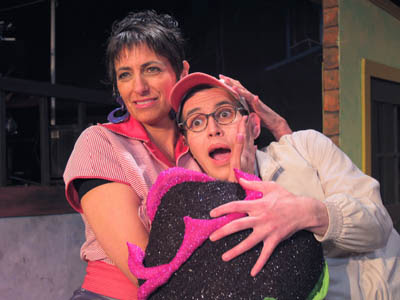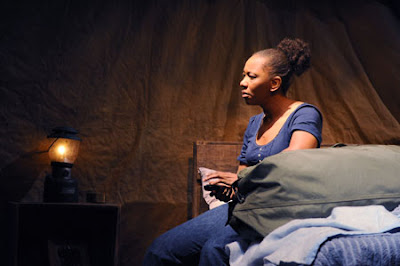Before I saw August Wilson's play,
Fences at the Oregon Shakespeare Festival earlier this month, I hadn't seen a production of it nor read it for around a decade. So with other Wilson plays I'd seen and read in recent years more in the forefront of my mind, I experienced this production with a certain innocence. I remembered some parts of the story, but not others. But in most ways, it was a first-time kind of experience. That turned out to be a big part of the experience for me.
So in my review I wrote about it without giving away much of the story, so others could also experience it that way. Deciding how much of the
play's story to tell is always a problem. Some people read reviews before they see a play--perhaps to help them decide whether to see it or not. But a lot of people who won't see the play (or at least this production) read the review anyway. So how do you not spoil the story for those who are going, while telling enough of the story to make it an interesting reading experience for those who aren't going? The answer varies according to circumstances, but it's almost always a problem.
A couple of other comments about that column. Doing a cost-benefit analysis on writing columns and reviews is always depressing, but sometimes more than others. Getting review tickets for Oregon Shakespeare Festival productions is one of the perks of this job, and a necessary one, because it offers some perspective on the North Coast theatre I usually see. But otherwise, it's a long (and increasingly costly) drive, it's a couple of nights in a motel, meals and four plays in three days (we usually arrive Thursday for the evening show, see two on Friday and one on Saturday before driving back.) And for all that, the paper pays zilch.
For many columns (which may include reviews/previews of two plays or more) there's time-consuming research. And then of course the job of writing, which often involves being as concise as possible. I thought of all this when I re-read the first paragraph of the
Fences review, and realized that it alone represented at least eight hours of reading. There were three facts from three separate sources in one sentence.
In that review, I write about the muscular but not physically large lead actor, and how Wilson noted that Troy
Maxson (the lead character) is a large man, and then I speculate on the importance of that largeness. But it was only after I wrote that, that this
piece from NPR was brought to my attention. It makes a big point out of the character's largeness. It also contains the one video clip of James Earl Jones' performance that I recall seeing before.
I wish I'd seen him do this play, as well as a subsequent touring production with John Henry Redwood as Troy
Maxson. I met John Henry and saw him in other roles (and he was a big man, and a very generous and lovely man, who, like August, died way before his time), as I saw the great Mary Alice, who originated the role of Rose in
Fences, in a different play with John Henry. (Courtney Vance, who was the first Cory, is now familiar to just about everybody from his television roles, particularly as the D.A. on
Law and Order: Criminal Intent.)
I suppose it's not too much of a tip-off to say that this play is about "love, honor, duty, betrayal," especially since August Wilson said that's what all his plays are about. But from here on, there are SPOILERS, so if you haven't seen
Fences and you intend to, maybe this is the place to stop reading.
Troy
Maxson reveals a major element of his biography late in the first act, including a crime he committed and the fact that he was imprisoned for it. It's said that August Wilson based this character partly on his stepfather, David
Bedford, who married his mother in 1957, the year this play takes place.
It was only after
Bedford's death that Wilson learned he had been a high school football star, but black players didn't get scholarships in 1930s Pittsburgh, so he tried to rob a store to get money to go to school. But during the robbery he killed a man, and spent 23 years in prison. The only job he could get when he got out was with the Pittsburgh sewage department. Troy
Maxson's story is similar.
August Wilson's relationship with
Bedford was difficult, and one area of conflict, as in the play, was over high school football. But while in the play, Troy's conflict with his son Cory is over Cory playing football (and being recruited by a North Carolina college), Wilson's was that he quit his high school team. (I'm not sure his Pittsburgh Central Catholic High School team played my
Greensburg Central Catholic High School team when we were both in high school, but if so we might have passed in the night way back then.)
Troy
Maxson goes off on the Pittsburgh Pirates for not playing Roberto Clemente because he was
Puerto Rican, and this was August's view as well, as he expressed it when we talked about the Pirates of that era. It's true that the now revered Clemente had a tough time his first several years in the 1950s. He complained of various injuries and got a reputation as lazy, which was clearly a racial byproduct. Ironically or not, the Pittsburgh Pirates--in a city that always had a complex attitude towards its black athletes--in 1971 became the first to field an all-black team (including the pitcher) in a World Series. The star of that team and that Series was Roberto Clemente.
Troy
Maxson was a Negro League player, and Pittsburgh had two of the best Negro League teams, the Homestead Grays and the Pittsburgh
Crawfords, with Satchel Paige pitching.
Wilson said this play began with an image, of a black man holding a baby, in a collage by the black Pittsburgh artist whose work inspired several of his plays,
Romare Bearden. Wilson wanted to portray a black man who felt the responsibility to stay with his family, and who did. He wanted to provide a counter-image to the prevalent stereotype of black men who are absent from their families, and black families without fathers.
The play demonstrates the cost of that, and the personal cost of thwarted ambition and self-expression, not only in Troy but in his wife, Rose, and both of his sons. Troy attributes his infidelity to the need to get beyond his fences of family and failure, though he is otherwise clueless about his projections onto his sons and the costs of thwarting the sports and college ambitions of Cory, or not supporting the musical ambitions of his eldest son, Lyons.
When he began writing
Fences, Wilson hadn't quite conceived the idea of writing a cycle of plays set in all the decades of the 20
th century. But in what is probably his most personal play in that it reflects his own childhood, he was already being true to the history of the African American family. Troy
Maxson stands at the midpoint of the century, and in the middle of so much else.
But though this was August Wilson's most popular play--and the one that assured his career as a playwright--it was not his favorite. As he said in interviews and as he told me, his favorite was the next one he wrote,
Joe Turner's Come and Gone. I'm still searching for the interview later in his life when he talked about all his plays. I seem to recall he ranked
Gem of the Ocean pretty highly, too.
I haven't mentioned Troy's brother, Gabriel, and I don't say much about him in my review. He is certainly a key figure in the play, as the wounded and addled often are in Wilson's plays. G.
Valmont Thomas does a fine job portraying him. But his size and big voice make me wonder what this production might have been like if he had played Troy and Robinson had played Gabriel. That might not have fit the director's vision (or the actors' schedules), but I would have liked to see it.
Robinson was quite compelling in the role, and he fit with other stylistic elements of this production. His interactions with Cory in particular felt real and nuanced, though contemporary audiences might have been more disturbed by the way that James Earl Jones seemed to deliberately humiliate Cory. But his key speech explaining his infidelity didn't have the visceral power it might have had. Nor really did the scene announcing the death of his mistress, or his bringing the baby to Rose. They worked for that audience--including me--mostly because of Wilson's words, I think. But as I wrote in my review, it was an emotional theatrical experience anyway, and I certainly
recommend it.









